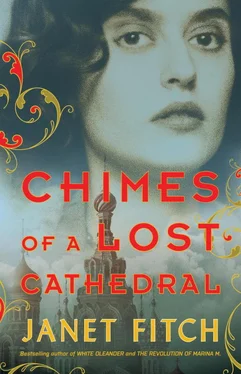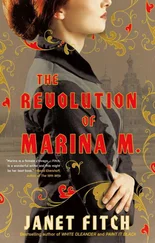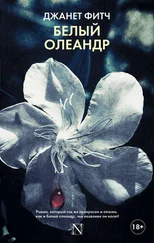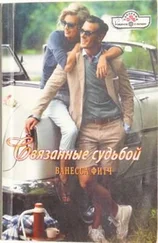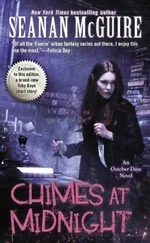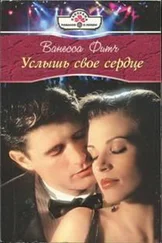The train swayed, the tea swayed, the hot wind blew through the open windows but cooled nothing. Gradually the typing began again. A group from the propaganda car came in, not Genya but three of his writers, plus Marfa Yermilova and her deputy, Antyushin. Originally from a peasant family, the commissar exuded confidence and capacity. I knew she excelled at persuading peasants to support the Red cause. She was about forty, a brisk walker, a fast talker, authoritative, and brooked no resistance. “We just had an excellent meeting,” she announced, pouring herself tea from the samovar—no shortage of hot water on the Red October. “The local peasants seem solid.”
“They’ll turn on you without blinking,” said the reporter from Kiev.
“That’s why we’re here,” she said. “To make sure they don’t.”
Antyushin smirked. “Worried, Motka?”
“Have you seen a pogrom, Antyushka?” Matvei said, his defiant chin quivering. “I was in Kishinev in ’03, during the Easter pogrom. Our neighbors came still damp from the bishop’s blessing. There was one woman, Sara Iosifovna, they drove nails into her eyes, and watched her run around screaming. And when they got tired of that, they killed her by nailing them in the rest of the way.” In ’03, he was probably five. I wished I could hold him, but it was not done on the Red October. “They broke into our houses and threw us out the windows. They cut the glazier’s balls off—he was trying to protect some girls.”
“Yes, yes,” said Marfa Yermilova, interrupting him. “They’re violent and unpredictable. But they’ll feed us if they think it’s in their interests.”
“Moskovitz,” he said, looking down at his typewriter. “The glazier. They castrated him, then they trampled him to death.”
“Do you believe in what we’re doing, Comrade Grossman?” the commissar snapped.
“It’s our only hope,” he said.
“Remember that.”
I remembered the mob in Haymarket Square, the violence of the bread riot. Varvara scolding the woman in line over that hideous pamphlet— They’re dragging the Jews in front of you like a bullfighter’s cape. And now it was happening again—not just in one village but in hundreds of villages, even in big cities. We had to win this war—the thought of what losing would mean was too hideous to contemplate.
“Denikin’s whipping them up,” said Marfa Yermilova, perched on the corner of the table with her tin cup, holster strapped across her breast. “That’s how desperate he is, trying to catalyze peasant support by serving up rape and murder. It’s an ancient recipe.”
“So much for your noble Cossack,” said Antyushin.
“Swans,” said the man from Krasnaya Gazeta . “So poetic.”
I thought of Volodya in the Denikin army. Would he be part of a pogrom? I hoped he had deserted and joined the Red cause, or just slipped away across the border. Though I suspected he had not. I imagined he, like Father, had made some strange peace with his conscience. All for the noble cause. Like a frog in a pot of water, simmering slowly—it didn’t have a moment where it decided This is too hot. One adjusted and adjusted, bearing each new disgusting compromise until it was too late. I felt suddenly ill, but didn’t have the energy to get up. I wished someone would make me a cup of tea. I moved closer to the window, hot wind in my face.
“Wait till the Siberians come,” said Grigory. “They make Denikin’s atamans look like schoolchildren. When they took Omsk, they flogged people with iron rods until the flesh tore right from their bodies.”
The heat, this talk… and we were heading right for them, not to Denikin but to Kolchak and the Siberians. Suddenly I pictured my belly ripped open, the baby flung out onto the tracks. I had not really considered what would happen if the agit-train were taken. Would I be raped before I died, my head cut off? I felt a dark wave of nausea rise up, and then I was falling backward.
Matvei caught me. “Sorry,” he said. “I shouldn’t have started. Could someone get her a cup of tea?”
Kostya brought me a cup, sweet with saccharine. But the talk of horrors continued: how Ataman Semyonov in the Transbaikal decorated the perimeter of his barbaric capital with hanged men and women like banners at a country fair. Freight cars of people were machine-gunned along the railway, buried in mass graves or not even buried, just left for the ravens. “Not even Bolsheviks,” said one of Genya’s sloganeers, Tudovkin. “Just peasants, anybody who gets in the way.”
Matvei was holding my hands. “Should I get Kuriakin?” he asked softly.
I shook my head, leaning against the half-open window, sipping sweet tea with its bitter undertone. There was a metaphor.
“They’ll live to regret it.” Marfa Yermilova’s sure voice rang out. “When they’ve got peasant revolt behind the lines, and us in front of them, they’ll understand that they dug their own graves.”
“Unless they get to us first,” Matvei said under his breath.
I had not been taking this seriously enough. It was up to us to make sure the Soviet Republic survived. Everyone, man, woman, child, sack of grain, scrap of fuel, and Soviet bullet, had to go into this. It was our job to reignite revolutionary hope in the hearts of workers and peasants, soldiers who could so easily desert if the war went badly. As I gazed out at the wide green land spread out under the blameless sky, lines of trees in the distance, the green of June, it was hard to imagine how badly the war might be going. How much misery this beautiful land had already absorbed, how much blood. Mongol and Slav, peasant and soldier. I couldn’t stop thinking about the pogroms—what cynicism, to buy the allegiance of peasants with the coin of unbridled violence, as if it were a tasty treat! Indulging hatreds as if it were a glorious and righteous thing. Did they really think it was? Or did they know it was evil in their hearts, and rejoice in being encouraged to evil? Still damp from the bishop’s blessing. There was certainly something perverse in human nature—and dangerous to believe it was not there.
I couldn’t stop thinking of Rech’, the Kadet newspaper, and my father and his friends, who were rationally deciding to use pogroms as an organizing tool. What happened to your English sense of fair play, Papa? Your John Stuart Mill? I knew what he would say. It’s terrible, but what else can we do? Once we’ve stopped the Bolshevik madness, we’ll find a way to put things to rights.
But you could not reclaim your soul once you’d sold it to the devil.
What was it in human beings that delighted in viciousness? Those crowds in the Ukraine that Easter, gripped by the miracle, their dazzled eyes falling on those who resisted salvation. Foreigners for hundreds of years, never accepted. Falling on them like wolves. Served up to distract from the master’s true ends. Don’t look at our failures! Look over there, those are the ones. The weak, the unprotected, the different.
But our side was capable of the same. I’d seen the Podharzhevskys digging in the snow. I’d been in the cells of the Cheka. Go ahead, we’ll look the other way. No, we’ll applaud you! Something inside us gloried in cruelty. Dostoyevsky would say this is why we needed Christ. But religion was its birthing place, and belief the rails it ran upon. What we needed was more pity and less belief. Wasn’t it Kolya who said that idealists were the most dangerous ones? Yes, but also dangerous were the ones who believed in nothing. I’d once believed human beings were intrinsically good. But now I knew, decency and goodness were things you had to fight for, cultivate and protect, precious crops you had to water and guard and feed and nourish, to absorb the soulless viciousness that also lay dormant within the human breast.
Читать дальше
